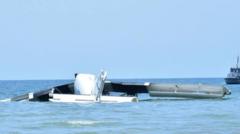The crash of Jeju Air Flight 7C 2216 in December has left investigators scrambling after the flight recorder ceased operation minutes before the incident.
**Jeju Air Flight Crash: Investigators Face Setback with Missing Flight Data**

**Jeju Air Flight Crash: Investigators Face Setback with Missing Flight Data**
Flight recorder failure raises questions in the aftermath of deadly Muan airport disaster.
The investigation into the tragic crash of Jeju Air Flight 7C 2216, which resulted in the loss of 179 lives last month, has hit a significant hurdle. South Korean officials reported that the flight recorder, commonly referred to as the black box, stopped its data recording just four minutes prior to the crash, complicating the inquiry into what exactly went wrong.
The crucial data typically retrieved from the cockpit voice recorder and flight data recorder is instrumental in aviation accident investigations. The South Korean Ministry of Land, Infrastructure and Transport announced on Saturday that the reasons for this abrupt halt in data recording remain unclear. “We plan to investigate why the data was not recorded,” spokespersons stated, expressing their commitment to derive answers from alternative data sources and analyses.
On December 29, Jeju Air Flight 7C 2216 was on approach to Muan International Airport with 181 people on board, coming in from Bangkok. As it neared landing, the pilot communicated a distress call, indicating a "Mayday" situation and a “bird strike.” The aircraft was reportedly going to abort its landing attempt to circle back for a second approach.
However, the pilot’s plan could not be executed as anticipated. Instead of completing the maneuver, the 737-800 attempted to land belly-first without deploying the landing gear, ultimately overshooting the runway. Just four minutes post the emergency declaration, the aircraft collided with a concrete structure adjacent to the runway, leading to a catastrophic explosion.
As investigators delve deeper, the absence of four critical minutes of data from the flight recorder looms heavily over efforts to ascertain the factors contributing to this devastating incident.
The crucial data typically retrieved from the cockpit voice recorder and flight data recorder is instrumental in aviation accident investigations. The South Korean Ministry of Land, Infrastructure and Transport announced on Saturday that the reasons for this abrupt halt in data recording remain unclear. “We plan to investigate why the data was not recorded,” spokespersons stated, expressing their commitment to derive answers from alternative data sources and analyses.
On December 29, Jeju Air Flight 7C 2216 was on approach to Muan International Airport with 181 people on board, coming in from Bangkok. As it neared landing, the pilot communicated a distress call, indicating a "Mayday" situation and a “bird strike.” The aircraft was reportedly going to abort its landing attempt to circle back for a second approach.
However, the pilot’s plan could not be executed as anticipated. Instead of completing the maneuver, the 737-800 attempted to land belly-first without deploying the landing gear, ultimately overshooting the runway. Just four minutes post the emergency declaration, the aircraft collided with a concrete structure adjacent to the runway, leading to a catastrophic explosion.
As investigators delve deeper, the absence of four critical minutes of data from the flight recorder looms heavily over efforts to ascertain the factors contributing to this devastating incident.





















